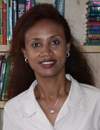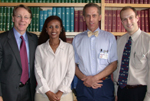Ethiopian doctor sharpens skills at Storm Eye
by Dick PetersonPublic Relations
In her country, Mulu Hailu, M.D., is one in a million. Actually, she’s one of 76 ophthalmologists in a country of more than 70 million people.
 Dr.
Mulu Hailu
Dr.
Mulu Hailu
“Ethiopia is not well equipped for medical care,” Hailu said. “There is only one center for training ophthalmologists, and that is in the capital, Addis Ababa.”
She has honed her subspecialty, pediatric ophthalmology, at MUSC for the past year. She returned to Addis Ababa Oct. 20 to rejoin her family and her practice. The fellowship she has trained under came as a result of her school’s collaboration with MUSC’s Storm Eye Institute and ORBIS, an international humanitarian organization dedicated to saving sight and eliminating avoidable blindness.
“It is a one-year sandwich program,” Hailu said. “I was here beginning in November 2003 for four months and then went back to Ethiopia in March for four months.” Wednesday marked the end of her second four-month period at Storm Eye. In February, Storm Eye Institute director Edward Wilson, M.D., with a nurse anesthetist and scrub nurse, will go to Ethiopia for a week to help Hailu equip a clinic in the government hospital in Addis Ababa.
Her connection to MUSC will not end there. She said she will continue her contact through a telemedicine project with Wilson as her overseas consultant.
Because she is not licensed to practice in the United States, Hailu could not perform the hands-on procedures a pediatric ophthalmology fellow at Storm Eye would normally do.
 From
left are Drs. Ed Wilson, Mulu Hailu, Richard Saunders and Rick Golub.
From
left are Drs. Ed Wilson, Mulu Hailu, Richard Saunders and Rick Golub.
“But here I was able to learn the practical skills I need as a pediatric ophthalmologist,” she said. She explained that the diagnostic skills alone approach an art when treating children. “It’s a challenge and requires patience, but I love it. And here I can learn from skilled experts.” Along with Wilson, she named Richard Saunders, M.D., and M. Millicent Peterseim, M.D., who contributed significantly to her training. “They listened to my suggestions, they answered my questions, and I assisted in surgeries.”
“Our goal with the program that Storm Eye initiated with Addis Ababa University is to teach the teachers,” Wilson said. “That way we can help them train more qualified ophthalmologists for the people of Ethiopia."
Children in Ethiopia number 48 percent of the population, a situation driven by poverty, a shortened adult life span and a lack of family planning, Hailu said.
“In this country, where children constitute nearly a majority, an estimated one million people —adults and children—are blind.” She said that it is not well known how many children are blind, but estimates say it can amount to 1.5 per 1,000 children. “That’s an estimate, but blindness in children is 80 percent preventable or treatable.”
What are the primary causes of blindness among children in Ethiopia?
“Measles, vitamin A deficiency,” she said. “After that, childhood cataracts and glaucoma.” She said that many children have low vision that amounts to blindness, but can be corrected with eyeglasses. And there is injury and trauma to the eyes. Left untreated or without steps taken to prevent blindness, children will spend most or all of their lives in blindness.
Hailu said that in rural areas of Ethiopia, herbalists follow traditional practices and apply herbal extracts to the eye that can actually increase the risk of blindness. This, she said, makes health education an important outreach endeavor.
While serving for two years in a rural area of Ethiopia following medical school, Hailu chose ophthalmology as a specialty. “I had a hard time diagnosing, referring and treating eye diseases,” she said. “Ophthalmology was a mystery for me, but it was something I wanted to know, an interesting subject.”
Her subspecialty, pediatric ophthalmology, was a choice that came from her love of children, she said. “And I love kids. I have kids of my own.” Hailu and her pediatrician husband, Wondeson, have three children, daughters Bethel, 7, and Selam, 5, and a son, Yoseph, 3. Comparing American with Ethiopian children, Hailu said that the real difference between Ethiopian and American children is that many Ethiopian children are underprivileged and denied their basic rights.
Hailu said that on her return to Ethiopia she intends to include rural outreach in an effort to educate people about the importance of preventing blindness, protecting sight and properly treating eye disease. “I will look for ways to get into the community and get kids to have their eyes tested,” she said.
“It has been an honor to have Mulu train with us,” Wilson said. “She is very intelligent, well read, and very motivated. She will pass on what she has learned to others.”
He said that because of a unique telemedicine program called CyberSight,
launched by ORBIS, Mulu’s mentors at MUSC are only a mouse click away from
her and all of her other Storm Eye-trained faculty colleagues.
Friday, Nov. 19, 2004
Catalyst Online is published weekly, updated
as needed and improved from time to time by the MUSC Office of Public Relations
for the faculty, employees and students of the Medical University of South
Carolina. Catalyst Online editor, Kim Draughn, can be reached at 792-4107
or by email, catalyst@musc.edu. Editorial copy can be submitted to Catalyst
Online and to The Catalyst in print by fax, 792-6723, or by email to petersnd@musc.edu
or catalyst@musc.edu. To place an ad in The Catalyst hardcopy, call Community
Press at 849-1778.